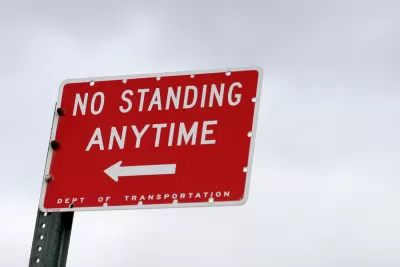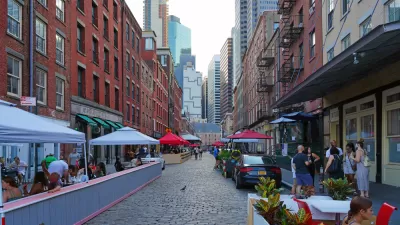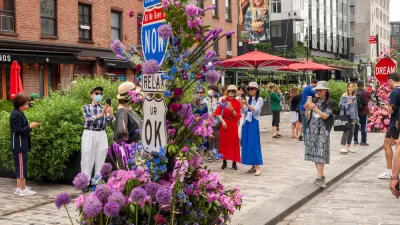The New York Department of Transportation is changing the way it plans and manages open streets as political support for the concept wavers.

"The [New York City] Department of Transportation has abruptly scuttled the Upper West Side’s only north-south open street," according to an article by Streetsblog New York City. The story about the nine-block stretch of West End Avenue between 87th and 96th streets is indicative of the city's recent retreat from car-free ambitions that gained political will and public momentum in the city during the pandemic.
According to the article, Upper West Side residents and organizations are being told by the NYCDOT that community groups will be necessary to "manage" and "enforce" new open streets.
Here's how the article describes the open street back in its heyday:
During the spring and early summer, when many Upper West Siders fleeing the city, the West End Avenue open street offered residents a quieter neighborhood, low traffic, a slower pace and, most important, a safe place to get outside at a proper distance. Some residents pulled out lawn chairs; others taught their kids to ride bikes. One doorman led the neighbors in nightly 7 p.m. “whoop” for essential workers.
That was before. In recent months, according to the article, the street started filling up with cars again—creating conflicts that have been materializing in New York City with greater frequency in recent weeks. The political power of car-centric use of public space has also been evident in the city's slow rollout of a bus priority program announced in June.
Based on the report, the decision to end the West End Avenue open street isn't the result of a push by the city to improve community buy-in, similar to steps taken to address equity in open streets planning during the pandemic in Oakland, California. In New York City, the political cause is traced to a specific "pro-parking, pro-driving agitator."
FULL STORY: ANATOMY OF A DEBACLE: DOT Eliminates Open Street on West End Avenue

Trump Administration Could Effectively End Housing Voucher Program
Federal officials are eyeing major cuts to the Section 8 program that helps millions of low-income households pay rent.

Planetizen Federal Action Tracker
A weekly monitor of how Trump’s orders and actions are impacting planners and planning in America.

Ken Jennings Launches Transit Web Series
The Jeopardy champ wants you to ride public transit.

California Invests Additional $5M in Electric School Buses
The state wants to electrify all of its school bus fleets by 2035.

Austin Launches $2M Homelessness Prevention Fund
A new grant program from the city’s Homeless Strategy Office will fund rental assistance and supportive services.

Alabama School Forestry Initiative Brings Trees to Schoolyards
Trees can improve physical and mental health for students and commnity members.
Urban Design for Planners 1: Software Tools
This six-course series explores essential urban design concepts using open source software and equips planners with the tools they need to participate fully in the urban design process.
Planning for Universal Design
Learn the tools for implementing Universal Design in planning regulations.
Ada County Highway District
Clanton & Associates, Inc.
Jessamine County Fiscal Court
Institute for Housing and Urban Development Studies (IHS)
City of Grandview
Harvard GSD Executive Education
Toledo-Lucas County Plan Commissions
Salt Lake City
NYU Wagner Graduate School of Public Service




























